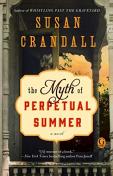BKMT READING GUIDES
The Myth of Perpetual Summer
by Susan Crandall
Paperback : 368 pages
6 clubs reading this now
0 members have read this book
Tallulah James’s parents’ volatile relationship, erratic behavior, and hands-off ...
Introduction
From the national bestselling author of Whistling Past the Graveyard comes a moving coming-of-age tale set in the tumultuous sixties that harkens to both Ordinary Grace and The Secret Life of Bees.
Tallulah James’s parents’ volatile relationship, erratic behavior, and hands-off approach to child rearing set tongues to wagging in their staid Mississippi town, complicating her already uncertain life. She takes the responsibility of shielding her family’s reputation and raising her younger twin siblings onto her youthful shoulders.
If not for the emotional constants of her older brother, Griff, and her old guard Southern grandmother, she would be lost. When betrayal and death arrive hand in hand, she takes to the road, headed to what turns out to be the not-so-promised land of Southern California. The dysfunction of her childhood still echoes throughout her scattered family, sending her brother on a disastrous path and drawing her home again. There she uncovers the secrets and lies that set her family on the road to destruction.
Excerpt
PrologueAugust 1972
San Francisco
I kneel in front of the small black-and-white television, my face close to the screen. My body is robbed of breath as the words of the newscaster cuts through a thick fog of shock. A mug shot appears. Blood rushes hot and my head goes fuzzy. Now grown and far too thin, that face still holds a distinct echo of the boy I so loved. My brother Walden…lost to me for years, now labeled a killer. ...
Discussion Questions
1. Why do you think Susan Crandall opens the novel with Walden’s arrest before revealing Tallulah’s backstory? How did your impression of Tallulah and her family evolve as the flashbacks unfolded?2. In what ways are the Jameses a product of time and place? How would the novel be different in another setting?
3. Crandall depicts Margo’s activism in stark contrast to her selfishness as a mother. Why do you think Margo is outraged by social injustice but blind to the needs of her children? What fuels her outrage?
4. Does The Myth of Perpetual Summer reinforce or challenge any preconceptions you had about the 1960s South?
5. Discuss how the different characters perceive racial discrimination and the Civil Rights Movement. What do their various experiences and responses to racism say about them?
6. While Tallulah envies the stability of Ross’s family, she understands that their expectations for him are stifling in their own way. Which would you prefer? Ultimately, is Tallulah’s family her millstone or salvation?
7. How are the James children defined by their parents’ actions? Discuss how each of the siblings emulate and/or resist Margo’s and Drayton’s behavior.
8. Discuss how Tallulah’s childhood point of view shaped your impression of Drayton’s behavior in the flashback chapters. How did your understanding of his mental illness shift over the course of the novel?
9. Drayton tells Tallulah that history is like “dominoes set in motion on one era toppling those in the next” (pg. 72). How does this theory bear out for the James family? What does it take for Tallulah to break from the past and gain agency over her own life?
10. “Gran says family traditions are what give meaning to life,” Crandall writes (pg. 304). “But that’s not it. The family itself, if we accept it for what it is and not condemn it for what it is not, can be the fiber that weaves a rope that pulls us out of ourselves, and into a world where we’re willing to take an emotional risk.” Discuss the distinction here between tradition and family. How does the latter empower Tallulah to come out of her shell?
11. Why do you think the “ugly parts” of the James family’s history bring some of the siblings together and drive others apart?
12. Toward the end of the novel, Gran characterizes the cover-up of George’s death as “a lie of convenience that was meant to spare pain, not cause it” (pg. 316). What do you make of Gran’s obsession with keeping up appearances? Do you see her commitment to upholding the family legacy as shortsighted and harmful or practical?
13. Gran tells Tallulah that “hurt and anger make a strong person brave and a weak person broken” (pg. 317). Do you agree with this statement? Why or why not?
14. Discuss the ending of the novel. Were you surprised that Tallulah returns to Lamoyne? How is she able to make the family plantation a happy home despite her painful memories?
15. What do you make of the title? Did your perception of the “myth of perpetual summer” change over the course of the novel?
Enhance Your Book Club
1. Host a Southern-style brunch for your book club discussion. Don’t forget the mint juleps and the pecan pie!
2. Read up on the Civil Rights Movement and discuss how your learnings inform the historical backdrop in The Myth of Perpetual Summer.
3. Cast your film version of The Myth of Perpetual Summer. Which actors would you want to play the main characters, and why?
4. Read one of Susan Crandall’s other historical novels (http://susancrandall.net/susan-crandalls-booklist). Discuss which is your favorite, and why.
5. Learn more about Susan Crandall by checking out http://susancrandall.net/ or following her on Twitter @susancrandall.
Book Club Recommendations
Recommended to book clubs by 0 of 0 members.
Book Club HQ to over 90,000+ book clubs and ready to welcome yours.
Get free weekly updates on top club picks, book giveaways, author events and more








